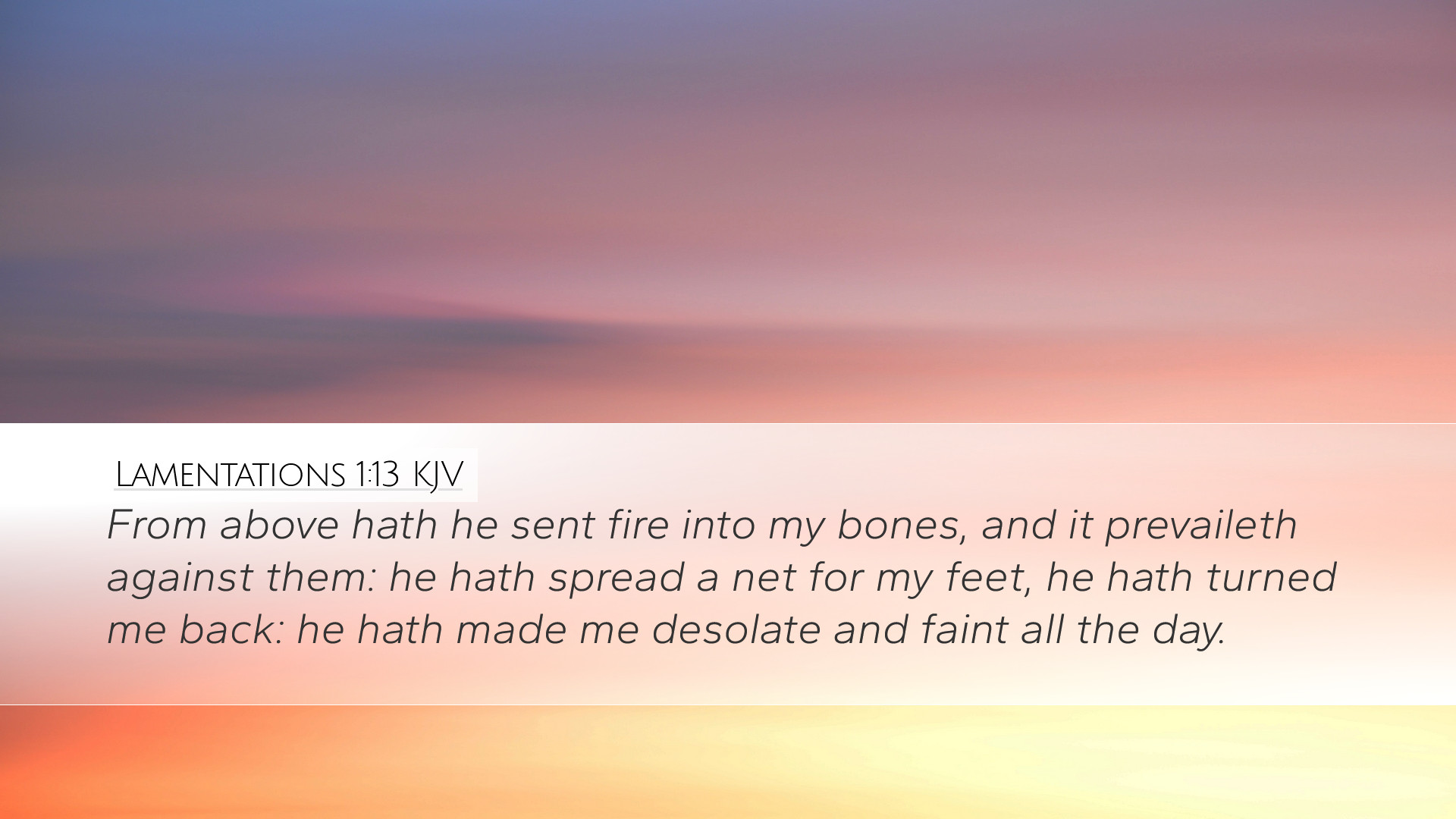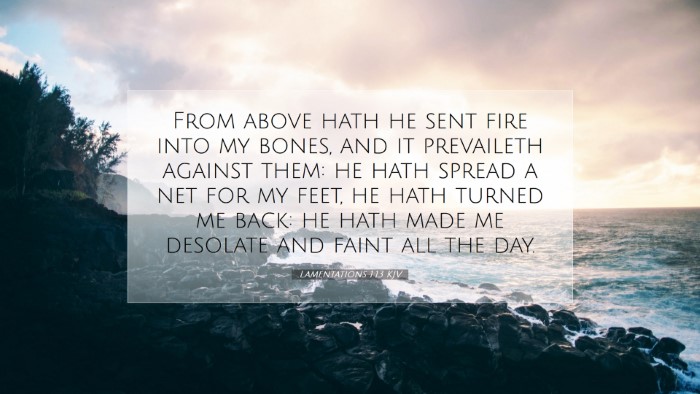Lamentations 1:13 Commentary
"From above hath He sent fire into my bones, and it prevaileth against them: He hath spread a net for my feet; He hath turned me back: He hath made me desolate and faint all the day."
The Book of Lamentations is a profound expression of mourning and sorrow in the aftermath of the destruction of Jerusalem. In Lamentations 1:13, we find the author, traditionally believed to be the prophet Jeremiah, articulating the deep anguish experienced in this time of devastation. The verse reflects spiritual and physical affliction brought by divine judgments and the impact of sin. This commentary will explore various aspects of this verse by drawing from respected public domain commentaries.
Contextual Analysis
Before delving into exposition, it is crucial to understand the context surrounding Lamentations. Jeremiah, witnessing the calamity that befell Jerusalem, uses poignant imagery to express the pain of loss and suffering. In this chapter, the fall of the city is personified, giving voice to the devastated populace and their grief.
Exegesis of Key Phrases
- “From above hath He sent fire into my bones”: This phrase illustrates the intensity of the suffering the author feels. Albert Barnes interprets this as the burning sensation of anguish that penetrates deep within the soul. The image of fire is often used in Scripture to symbolize judgment and purification, indicating that the suffering is both destructive and transformative.
- “and it prevaileth against them”: Here, we see the totality of the affliction. The use of “prevaileth” emphasizes that the affliction is overwhelming. Matthew Henry notes that the pain is pervasive, infiltrating every aspect of life.
- “He hath spread a net for my feet”: This metaphor suggests a trap, which signifies entrapment and helplessness. Adam Clarke draws attention to this imagery, highlighting the feeling of being ensnared by circumstances beyond control, possibly reflecting sin or divine judgment.
- “He hath turned me back”: This phrase indicates a reversal of fortune or purpose. It signifies a divine redirection, where the individual feels unable to move forward. Henry suggests this may symbolize a loss of agency and the repercussions of Israel's sins.
- “He hath made me desolate and faint all the day”: The final part of the verse encapsulates the pervasive nature of despair. The term “desolate” conveys a sense of abandonment and emptiness. Barnes notes that it signifies a complete wasteland of hope and vitality.
Theological Implications
This verse reveals several theological truths. First, it reflects the reality of divine discipline. Christians must understand that suffering can often stem from God’s desire to call us back to a path of righteousness. The imagery of fire can also be seen in the context of purification through suffering. As Peter writes, we should rejoice in our sharing in Christ's sufferings (1 Peter 4:12-13), hoping to reflect His glory.
Secondly, it communicates the gravity of sin. The desolation experienced by Jerusalem is a direct result of the people’s departure from God. It serves as a sobering reminder for contemporary believers of the consequences of unrepented sin. Clarke posits that Jeremiah’s lamentation highlights the fragility of human circumstances in the absence of God’s grace.
Pastoral Applications
For pastors and leaders, Lamentations 1:13 serves as a poignant text for congregations experiencing grief, loss, or spiritual barrenness. Here are some applications to consider:
- Encouragement in Suffering: Pastoral care can utilize this verse to help others confront their spiritual and emotional anguish. It is vital to reassure the afflicted that such feelings are acknowledged in Scripture and that they are not alone in their suffering.
- Teaching on Sin and Discipleship: This scripture can be a jumping-off point for discussions on the seriousness of sin and its impact on one’s spiritual life. Emphasize the need for repentance and the hope found in turning back to God.
- Prayer and Intercession: Encourage congregational prayer for those who feel desolate, incorporating Lamentations 1:13 into prayer life can be powerful in invoking God’s mercy and healing.
Conclusion
Lamentations 1:13 is a vivid reminder of the depth of human suffering and the reasons behind it. It is a call to attention regarding the consequences of sin and the importance of turning back to God, who at times employs affliction as a means of correction. By examining the text thoroughly through the insights provided by commentaries of respected theologians, one can garner a deeper understanding and application of this scripture. Thus, this exploration seeks to equip pastors, students, theologians, and scholars with the necessary tools to glean from such a profound verse.


